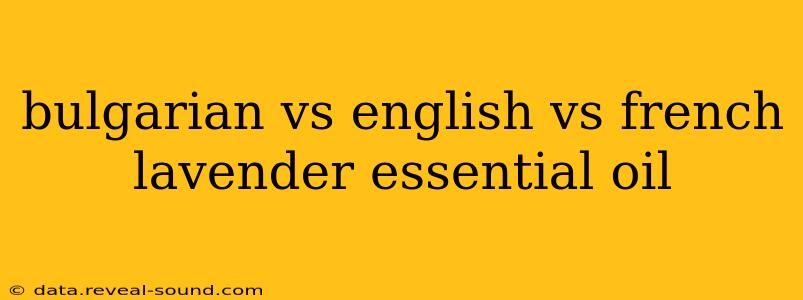Lavender essential oil, prized for its calming aroma and therapeutic properties, boasts a diverse range of cultivars, each with unique characteristics. This article delves into the distinctions between three prominent varieties: Bulgarian, English, and French lavender essential oils. Understanding these differences is crucial for selecting the right oil for your specific needs, whether it's aromatherapy, skincare, or other applications.
What are the key differences between Bulgarian, English, and French Lavender essential oils?
The primary differences lie in their chemical composition, aroma profile, and consequent therapeutic properties. These variations stem from the specific Lavandula species and the environmental conditions where they are grown.
-
Bulgarian Lavender (Lavandula angustifolia): Often considered a superior variety, Bulgarian lavender boasts a higher concentration of linalyl acetate, the primary component responsible for its sweet, floral aroma. This high linalyl acetate content contributes to its potent calming and relaxing effects, making it ideal for stress relief and sleep improvement.
-
English Lavender (Lavandula angustifolia): Similar to Bulgarian lavender in its chemical profile, English lavender also contains significant amounts of linalyl acetate, though typically slightly less than its Bulgarian counterpart. Its aroma is similarly floral and sweet, but it may have a slightly herbaceous undertone. It shares many of the same therapeutic benefits as Bulgarian lavender.
-
French Lavender (Lavandula intermedia or Lavandin): This is where things get a bit more complex. "French lavender" often refers to Lavandula intermedia, a hybrid of Lavandula angustifolia and Lavandula latifolia. This hybrid generally has a higher concentration of linalool and camphor compared to angustifolia varieties, resulting in a more robust, less delicate aroma. It's often described as having a slightly more camphoraceous and less floral scent. Because of its different chemical composition, its therapeutic properties may differ subtly. It is often used more for its cleansing and purifying properties, and is sometimes a less expensive option. It’s important to note that not all French lavender is Lavandula intermedia; some producers might use other French-grown Lavandula angustifolia varieties.
Which type of lavender essential oil is best for relaxation and sleep?
For optimal relaxation and sleep improvement, Bulgarian lavender is frequently cited as the top choice due to its higher concentration of linalyl acetate. However, English lavender also provides excellent calming benefits and may be a suitable alternative. The effects are largely subjective, so personal preference plays a role.
Which lavender essential oil is best for skincare?
All three varieties can be beneficial for skincare, but their properties differ slightly. English and Bulgarian lavender, with their higher linalyl acetate content, are often preferred for sensitive skin due to their gentler nature. French lavender, with its higher camphor content, might be more suitable for oily skin or for use in cleansing products. Always perform a patch test before applying any essential oil directly to your skin.
What is the difference in price between Bulgarian, English, and French lavender essential oil?
Generally, Bulgarian lavender is considered the most premium and therefore the most expensive. English lavender falls somewhere in the middle, while French lavender (especially Lavandula intermedia) tends to be the most affordable. Pricing can also vary depending on the producer, quality, and method of extraction.
How can I tell if my lavender essential oil is pure?
Determining the purity of essential oils can be challenging without laboratory testing. Look for reputable suppliers who provide detailed information about their sourcing, extraction methods, and chemical composition (GC/MS reports). A truly pure essential oil should possess a strong, consistent aroma characteristic of the specific lavender variety. Avoid oils that are unusually cheap or have a weak or artificial scent.
Which lavender essential oil is best for making soap?
While all three can be used, French lavender (Lavandula intermedia) is often favoured for soapmaking due to its stronger scent and potentially lower cost. However, the choice ultimately depends on your desired aroma profile and budget.
Choosing the right lavender essential oil hinges on understanding these nuances. While all offer therapeutic benefits, their distinct chemical compositions and aromatic profiles lead to unique applications and efficacy in different contexts. Always purchase from trusted suppliers to ensure quality and purity.
